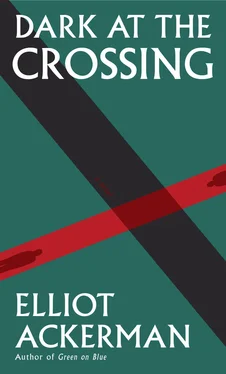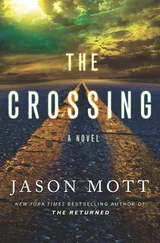He sat next to Haris, tilting back his head, raising his face toward the sky as if to feel the rain on his cheeks. “This is the night,” Athid said in a whisper.
Haris leaned his head back too. He felt no rain. The wind died down, bringing quiet. The moon still shone bright and wouldn’t set until the early morning.
“Where is Saied?” asked Haris.
“Watching Bashar,” answered Athid. “Get your things.”
Haris walked quickly back to the tent. He gathered his hiking pack. He put on his old camouflage rain jacket though there was no rain. Rushing to cross the border, he found himself thinking of Saied, and the little dog.
—
It was a two-mile walkto the crossing. A dirt path wound through a quilt of partitioned fields, each strewn with untilled soil. In some of the fields pistachio orchards grew, but the Turkish farmers had harvested these trees weeks ago. They looked ugly and mean, their low branches sharp and bare. They would remain this way through the winter, until the next crop’s yield.
Haris and Athid’s boots crunched against the brittle path. The noise of their steps unnerved Haris — they were too loud. The sky cleared and the moon seemed even brighter. The homes of the farmers speckled the fields. Antennae and satellite dishes sprouted from thatched roofs, pointing north, away from the border. In a window or a door, Haris saw an occasional light. He wondered whether they could take a longer route, one that avoided any home with a light, but he didn’t ask Athid. Haris’s shoulders ached beneath the weight of his pack. He looped his thumbs under the straps, but this made his thumbs ache. He thought he might ask Athid to slow down, but he didn’t do this either.
Athid walked at a brisk pace, but casually, his hands buried in the pockets of his olive-green jacket. He didn’t carry a heavy hiking pack like Haris’s but a book bag that couldn’t hold much more than a change of clothes. It swung like a metronome on his back, keeping time. Now and then, Athid looked over his right shoulder, a few hundred meters to the south, where the ground sloped down, leveling out along the border. A pair of chain-link fences paralleled the border’s length, topped with coiled razor wire. The space between the fences was a no-man’s-land, just wide enough for two cars to pass.
Athid didn’t look at the border for long, but instead searched the ground in front of him. The culverts had been dug into the upturned and resting soil, each sealed with a padlocked manhole cover. Athid and Haris passed nearly a dozen. All were shut. Haris grew nervous. The fields weren’t flooded, and when the sun rose they’d be discovered trespassing on some farmer’s property. Uncomfortable as this made Haris, what frayed his nerves to their ends was Athid’s certainty they’d find a way. It edged on recklessness.
An irrigation ditch appeared ahead of them, a boundary running between two farmers’ fields. Water and mud pooled in its dark bottom. It stank of decay. Athid took a step back and charged at it, jumping across. He landed heavily on the far bank. Mud sucked at his feet, but he picked them up easily enough.
Haris stood on the near bank. Athid glanced back, offering his hand. Haris waved it away, cinching down his shoulder straps. Athid offered his hand again. Haris ignored it, taking a few steps back. He too charged the bank, jumping with all his strength, throwing his body forward. His bulky hiking pack turned him in the air, spinning him sideways. He flailed his arms once, clutching toward dry ground. It didn’t help. He landed right in the middle of the irrigation ditch, his pack pulling him backward into the stagnant water.
Athid lunged after him, hooking Haris beneath his armpits, dragging him out from his shoulder straps and onto the far bank. Haris was soaked from the waist down, and he stank from the water. Athid leaned into the irrigation ditch and fished out Haris’s pack. He sat it next to Haris and stood over him, staring down his nose. Haris struggled to his feet. Water trickled along the backs of his legs, pooling in his boots. He reshouldered his pack, heavier now that it was wet, and stumbled forward. Lending a hand, Athid held the pack’s bottom so Haris could properly tighten the straps.
“You should’ve taken my help,” said Athid.
“I thought I could make it on my own.”
They continued down the dry path. To their right, in the southern sky, the moon dissolved, setting behind the low-slung hills of Aleppo Governorate. Without the moon, darkness fell through the fields while the first stars formed clear, hardened points above. Haris’s waterlogged pack slowed him. Out of breath and with aching shoulders, he wasn’t certain how much further he could go. All that he carried dripped a long trail of brackish water in the dust behind him.
—
On the sideof the path, Haris sat waiting. The sound of Athid’s steps grew faint and then disappeared entirely as he cut across a barren field to check if one of the culverts was unlocked.
Haris looked at his watch. Through the darkness, he couldn’t distinguish the hands on its face. He angled his wrist to the sky, hoping to catch some light. Nothing. Dark as it was, he knew enough night remained for the crossing. That wasn’t what bothered him. He wanted to know the time so he might imagine what was going on at home. Maybe if he knew it was five p.m. back in Dearborn — when he’d be finishing his job at the university as a custodian, a handyman who fixed small things — he’d know he had made the right choice quitting such work. Or, if it was seven p.m. back there — when he’d be eating alone, a reheated bowl of rice and spiced lamb baked in a dolma by Samia — he’d know all he had lost by giving up his old life was convenience.
He remembered three a.m., too, the hour when he had returned home after his drink at the hotel. That night, he had assumed Samia would be asleep but found her sitting on his sofa bed, her face in her hands. He hadn’t even slipped the door shut when she threw a pillow at him, then another, until a barricade of pillows stacked at his feet. Before he could devise a story of where he’d been, his sister demanded to know why he would sneak out, whether he planned to abandon her, whether he had brought her here for his new life instead of both of theirs.
To assuage his guilt about leaving Samia that night, or perhaps to assuage his homesickness, which itself felt like a form of unquenchable guilt, Haris walked his sister to the university every day that week, waiting outside her classroom in the Michigan winter. The faculty soon asked about the man loitering around campus in a thin camouflage rain jacket, and shortly thereafter offered Haris the charity of a job, which came with a discount in Samia’s tuition. His hours now began earlier than Samia’s and finished later, so they began to walk separately to the university. He noticed how she started to avoid him, how when he saw her, pushing his mop in the navy slacks and the powder blue shirt that were his new uniform, she would speak to him with her eyes downcast and explain that she was late to her next class.
The spring of Samia’s second year she began dating an Emirati boy whom Haris had no reason to disapprove of, whose passport came soused with oil money and stamped with a student visa, and who had a car of his own. Samia had told her brother it was a BMW. Haris made a point of often forgetting the Emirati’s name, of lecturing his sister about the poverty and indignity some Arabs (Iraqis, Syrians, Yemenis) faced while others (Saudis, Kuwaitis, Emiratis) indulged in luxury. He also made a point of never being around to see the car.
He took another look at his watch. Sitting on the side of the path, waiting for Athid to return across the field, Haris stared to the south, toward the border, and into the perfect blackness. All he could do was listen, and wait.
Читать дальше












